2019英语专四作文范文:学术造假
学术造假的影响英语作文
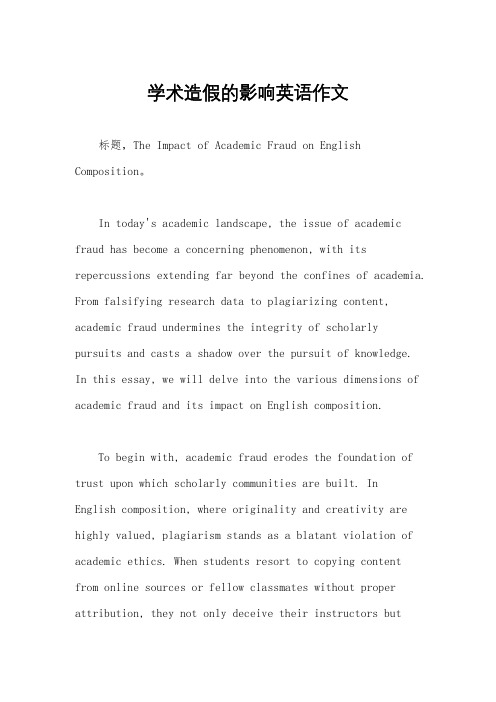
学术造假的影响英语作文标题,The Impact of Academic Fraud on English Composition。
In today's academic landscape, the issue of academic fraud has become a concerning phenomenon, with its repercussions extending far beyond the confines of academia. From falsifying research data to plagiarizing content, academic fraud undermines the integrity of scholarlypursuits and casts a shadow over the pursuit of knowledge.In this essay, we will delve into the various dimensions of academic fraud and its impact on English composition.To begin with, academic fraud erodes the foundation of trust upon which scholarly communities are built. InEnglish composition, where originality and creativity are highly valued, plagiarism stands as a blatant violation of academic ethics. When students resort to copying content from online sources or fellow classmates without proper attribution, they not only deceive their instructors butalso compromise their own learning process. The essence of English composition lies in the expression of one's unique ideas and perspectives, and plagiarism undermines this fundamental aspect, rendering the writing devoid of authenticity and intellectual merit.Moreover, academic fraud perpetuates a culture of dishonesty that permeates beyond the academic realm andinto various facets of society. When students engage in unethical practices such as fabricating research findings or purchasing pre-written essays, they fail to develop the critical thinking and analytical skills necessary for academic and professional success. English composition serves as a platform for students to hone their communication skills and cultivate a deeper understanding of language and literature. However, when academic fraud prevails, the true essence of English composition is distorted, and students are deprived of the opportunity to engage meaningfully with the subject matter.Furthermore, the prevalence of academic fraud undermines the credibility of academic institutions and thequalifications of their graduates. In an increasingly competitive job market, employers place a premium on candidates who possess strong writing and communication skills. However, when academic credentials are tainted by instances of plagiarism or cheating, employers may question the legitimacy of an individual's qualifications, casting doubt on their competency and integrity. Thus, academic fraud not only jeopardizes the academic integrity of individual students but also undermines the reputation of the institutions they represent.In addition to its immediate repercussions, academic fraud has broader societal implications that extend to the realm of language and culture. English composition serves as a vehicle for cultural expression and cross-cultural communication, enabling individuals to engage with diverse perspectives and experiences. However, when academic fraud distorts the authenticity of written expression, it undermines the richness and diversity of language, perpetuating a culture of superficiality and homogeneity. In a world where communication plays an increasingly vital role in bridging cultural divides, the erosion oflinguistic integrity poses a significant barrier to meaningful dialogue and understanding.In conclusion, the impact of academic fraud on English composition is far-reaching and multifaceted. From undermining the integrity of scholarly pursuits to perpetuating a culture of dishonesty, academic fraud poses a threat to the core principles of academic excellence and intellectual integrity. As stewards of knowledge and guardians of academic integrity, it is incumbent upon students, educators, and institutions alike to uphold the values of honesty, diligence, and intellectual curiosity in the pursuit of knowledge and learning. Only by confronting the scourge of academic fraud head-on can we safeguard the integrity of English composition and preserve its role as a cornerstone of scholarly inquiry and cultural exchange.。
学术作假英文作文

学术作假英文作文Academic fraud is a serious issue that undermines the integrity of the education system. It involves dishonest practices such as plagiarism, fabrication of data, and ghostwriting. These actions not only deceive the academic community but also hinder the progress of knowledge and innovation. Academic fraud is a betrayal of trust and undermines the credibility of both the individual and the institution.Plagiarism, for instance, is a common form of academic fraud. It involves using someone else's work without giving proper credit. This can range from copying and pasting entire paragraphs from a source to paraphrasing without acknowledging the original author. Plagiarism not only robs the original author of their intellectual property but also prevents the plagiarizer from developing their own critical thinking and research skills.Fabrication of data is another form of academic fraudthat is equally damaging. This involves falsifying research findings or manipulating data to fit a desired outcome. Fabricated data not only misleads the academic community but also wastes valuable time and resources. It can lead to false conclusions and hinder scientific progress, as other researchers may base their work on false information.Ghostwriting is a deceptive practice in which someone else writes a paper or article on behalf of the credited author. This is often done to enhance the perceived credibility of the author or to meet publication requirements. Ghostwriting not only undermines the author's integrity but also distorts the academic record. It prevents the true author from receiving proper recognition for their work and can lead to a skewed understanding of the field.Academic fraud not only harms individuals and institutions but also has broader societal implications. It erodes public trust in the education system and undermines the value of academic achievements. It creates an unfair advantage for those who engage in fraudulent practices,depriving deserving individuals of opportunities. Moreover, it perpetuates a culture of dishonesty and undermines the ethical foundations of academia.To combat academic fraud, institutions must prioritize integrity and promote a culture of academic honesty. This can be achieved through educating students about the importance of ethical conduct, providing resources for proper citation and research techniques, and implementing strict consequences for those who engage in fraudulent practices. Additionally, fostering an environment that values originality and critical thinking can discourage the temptation to cheat.In conclusion, academic fraud is a serious issue that undermines the integrity of the education system. It involves dishonest practices such as plagiarism,fabrication of data, and ghostwriting. These actions not only deceive the academic community but also hinder the progress of knowledge and innovation. To combat academic fraud, institutions must prioritize integrity and promote a culture of academic honesty.。
学术造假英语作文
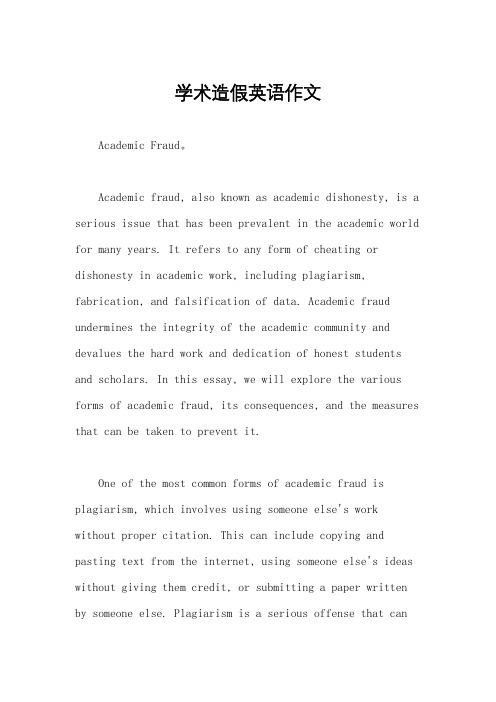
学术造假英语作文Academic Fraud。
Academic fraud, also known as academic dishonesty, is a serious issue that has been prevalent in the academic world for many years. It refers to any form of cheating or dishonesty in academic work, including plagiarism, fabrication, and falsification of data. Academic fraud undermines the integrity of the academic community and devalues the hard work and dedication of honest students and scholars. In this essay, we will explore the various forms of academic fraud, its consequences, and the measures that can be taken to prevent it.One of the most common forms of academic fraud is plagiarism, which involves using someone else's work without proper citation. This can include copying and pasting text from the internet, using someone else's ideas without giving them credit, or submitting a paper written by someone else. Plagiarism is a serious offense that canresult in severe consequences, including failing a course, suspension, or even expulsion from a university.Another form of academic fraud is fabrication, which involves inventing or falsifying data or information. This can occur in research papers, lab reports, or any other form of academic work that requires the use of data. Fabrication undermines the credibility of academic research and can have far-reaching consequences for the academic community as a whole.In addition to plagiarism and fabrication, academic fraud can also take the form of cheating on exams or other assessments. This can include looking at someone else's answers, using unauthorized materials, or communicating with other students during an exam. Cheating undermines the fairness and integrity of the assessment process and can have a detrimental impact on the academic environment.The consequences of academic fraud can be severe, both for the individual who commits the fraud and for the academic community as a whole. Students who engage inacademic fraud not only risk their academic standing but also their future careers. Employers and graduate schools often look unfavorably upon candidates with a history of academic dishonesty, and it can be difficult to rebuild trust once it has been broken.In order to prevent academic fraud, it is important for universities and academic institutions to take proactive measures. This can include educating students about the importance of academic integrity, providing clear guidelines for proper citation and research practices, and implementing strict consequences for those who engage in academic fraud. It is also important for educators to be vigilant in detecting and addressing instances of academic fraud, in order to maintain the integrity of the academic community.In conclusion, academic fraud is a serious issue that has far-reaching consequences for the academic community. It undermines the integrity of academic work and devalues the hard work and dedication of honest students and scholars. By taking proactive measures to prevent academicfraud and educating students about the importance of academic integrity, we can work towards creating a more honest and trustworthy academic environment.。
校园学术造假的原因及对策英语作文
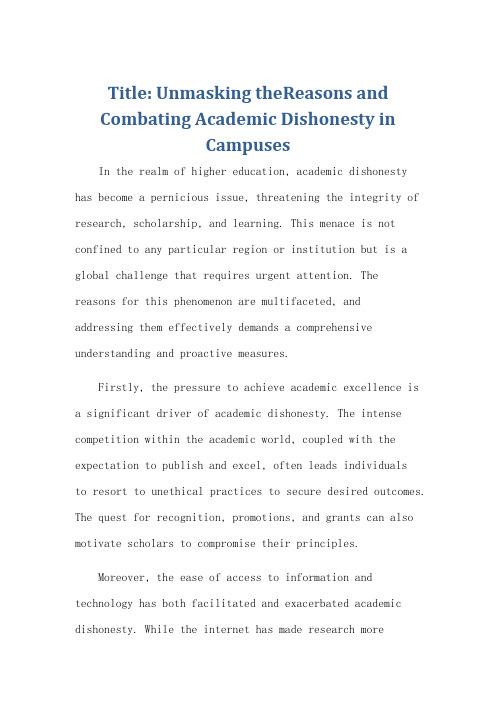
Title: Unmasking theReasons andCombating Academic Dishonesty inCampusesIn the realm of higher education, academic dishonesty has become a pernicious issue, threatening the integrity of research, scholarship, and learning. This menace is not confined to any particular region or institution but is a global challenge that requires urgent attention. Thereasons for this phenomenon are multifaceted, andaddressing them effectively demands a comprehensive understanding and proactive measures.Firstly, the pressure to achieve academic excellence is a significant driver of academic dishonesty. The intense competition within the academic world, coupled with the expectation to publish and excel, often leads individualsto resort to unethical practices to secure desired outcomes. The quest for recognition, promotions, and grants can also motivate scholars to compromise their principles.Moreover, the ease of access to information and technology has both facilitated and exacerbated academic dishonesty. While the internet has made research moreconvenient, it has also provided opportunities for plagiarism, fabrication of data, and other unethical practices. The anonymous nature of the digital worldfurther compounds this issue, as individuals may feel less accountable for their actions.Cultural and institutional factors also play a role. In some cultures, success is equated with achievement, and any means necessary to secure it are considered justifiable. Similarly, institutional cultures that prioritize quantity over quality, or that reward short-term gains over long-term sustainability, can foster an environment conducive to academic dishonesty.To combat this menace, a multifaceted approach is necessary. Firstly, institutions must establish a strong ethical framework that promotes honesty, integrity, and responsible conduct in research. This should include clear guidelines on acceptable academic practices, as well as mechanisms for reporting and investigating instances of dishonesty.Secondly, education is crucial. Both undergraduate and graduate students should be educated on the importance ofacademic integrity and the consequences of dishonesty from the outset of their academic careers. This should include sessions on ethical research practices, plagiarism, and citation guidelines.Thirdly, institutions should create an enabling environment that fosters critical thinking, creativity, and innovation. By providing resources, encouragement, and support, institutions can help scholars pursue their research interests ethically and productively. This approach not only discourages dishonesty but alsocultivates a culture of excellence and innovation.Lastly, stringent enforcement of sanctions is essential. When instances of academic dishonesty are discovered, institutions must take appropriate disciplinary action to ensure that the perpetrators are held accountable. This sends a clear message that such behavior is unacceptableand deterrents others from following suit.In conclusion, academic dishonesty is a complex issue that requires a concerted effort from all stakeholders to address. By understanding the root causes and implementingtargeted strategies, institutions can create an environment that fosters academic excellence, integrity, and innovation. **校园学术造假的原因及对策**在高等教育领域,学术不端已成为一个严重影响学术诚信的问题。
学术造假的原因及对策英语作文

学术造假的原因及对策英语作文Academic misconduct, including the act of falsifying research or committing plagiarism, is a serious and concerning issue in the world of academia. In order to understand the reasons behind this behavior and develop effective strategies to combat it, it is crucial to examine various factors that contribute to academic dishonesty.One possible reason for academic misconduct is the intense pressure and competition among researchers, scholars, and students. With limited funding opportunities and job prospects, individuals may resort to unethical practices as they feel pressured to produce results quickly. This pressure can drive them to fabricate data or plagiarize others' work in an attempt to gain recognition or secure their positions.Another contributing factor is the lack of awareness about ethical standards and proper research conduct. Many individuals may not fully understand the importance of integrity in academia or may not receive adequate educationon responsible research practices. Without a solid foundation in ethical behavior, they are more likely to engage in deceitful actions without considering the consequences.Moreover, advancements in technology have made it easierfor individuals to plagiarize or manipulate data undetected. With access to vast amounts of information online, it becomes tempting for some individuals to copy and paste materials from various sources without proper attribution. The ease with which one can manipulate data using software also increases the potential for academic fraud.To address these concerns and prevent further instances of academic misconduct, several measures can be implemented:1) Creating a culture of integrity: Educationalinstitutions should foster a culture where honesty andethics are valued. This can be achieved through promoting discussions on academic integrity, conducting workshops on responsible research practices, and reinforcing ethical standards through policies.2) Strengthening education on research ethics: Institutions should provide comprehensive training on research ethics and responsible conduct of research at all levels - undergraduate, graduate, and faculty. This includes educating researchers about appropriate citation methods, avoiding plagiarism, understanding intellectual property rights, etc.3) Implementing effective detection mechanisms:Institutions should invest in plagiarism detection software and establish robust systems for monitoring and identifying unethical practices. Regular checks should be conducted to verify the originality of research work and identify any instances of misconduct.4) Encouraging collaboration and mentorship: By promoting collaboration between researchers, scholars, and students, individuals can learn from experienced mentors who can guide them towards ethical conduct. Strong mentoring programs can help instill important values and emphasize the importance of integrity in academic pursuits.5) Consequences for misconduct: Institutions must enforce strict consequences for those found guilty of academic misconduct. This may include penalties such as retraction of published work, suspension, or even dismissal from the institution. Publicizing cases of misconduct will act as a deterrent and send a clear message about the seriousness of academic dishonesty.In conclusion, academic misconduct is a complex issue with various underlying causes. By addressing the factors contributing to unethical behavior and implementing effective strategies for prevention, we can strive to maintain integrity in academia and uphold the principles of responsible research conduct.。
学术造假的影响英语作文
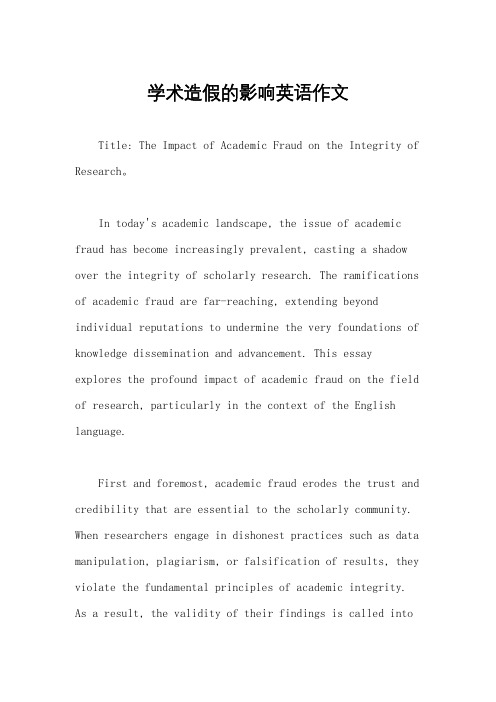
学术造假的影响英语作文Title: The Impact of Academic Fraud on the Integrity of Research。
In today's academic landscape, the issue of academic fraud has become increasingly prevalent, casting a shadow over the integrity of scholarly research. The ramifications of academic fraud are far-reaching, extending beyond individual reputations to undermine the very foundations of knowledge dissemination and advancement. This essay explores the profound impact of academic fraud on the field of research, particularly in the context of the English language.First and foremost, academic fraud erodes the trust and credibility that are essential to the scholarly community. When researchers engage in dishonest practices such as data manipulation, plagiarism, or falsification of results, they violate the fundamental principles of academic integrity. As a result, the validity of their findings is called intoquestion, leading to skepticism and skepticism among peers, academic institutions, and the general public. This erosion of trust not only damages the reputation of the individuals involved but also tarnishes the reputation of the entire academic discipline.Moreover, academic fraud undermines the reliability of published research, which serves as the cornerstone of scientific progress. In the field of English studies, where language and literature are scrutinized for their nuances and interpretations, the integrity of research findings is paramount. However, when fraudulent research is published alongside legitimate studies, it becomes increasingly difficult for scholars to discern the truth from falsehood. This not only hampers the advancement of knowledge but also impedes the development of innovative ideas and theories within the field.Furthermore, academic fraud perpetuates a culture of dishonesty and unethical behavior within academia. When researchers see their colleagues engaging in fraudulent practices and seemingly getting away with it, they may betempted to follow suit. This "slippery slope" phenomenon can create a cycle of misconduct that undermines the values of honesty, integrity, and professionalism that are supposed to guide scholarly endeavors. As a result, the entire academic community suffers, as trust and collaboration are replaced by suspicion and rivalry.In addition, academic fraud has serious implicationsfor the education system, particularly for students who are taught by dishonest scholars. When students are exposed to fraudulent research or are unwittingly encouraged to engage in academic misconduct themselves, the integrity of their education is compromised. This not only undermines the value of their degrees but also perpetuates a cycle of unethical behavior that can persist throughout their academic and professional careers.Moreover, academic fraud has broader societal implications beyond the confines of academia. In an era where scientific research informs public policy, technological advancements, and social discourse, the dissemination of false or misleading information can havedire consequences. In the field of English language studies, for example, fraudulent research could lead to misguided language policies, inaccurate language assessments, or misinformed language teaching practices. Thus, the impactof academic fraud extends far beyond the ivory tower, affecting the lives of people around the world.In conclusion, academic fraud poses a significantthreat to the integrity of research, particularly in thefield of English language studies. By eroding trust, undermining reliability, perpetuating dishonesty, compromising education, and having broader societal implications, academic fraud undermines the veryfoundations of scholarly inquiry. Addressing this issue requires a concerted effort from researchers, academic institutions, funding agencies, and publishers to upholdthe principles of academic integrity and ensure that the pursuit of knowledge remains honest, transparent, and ethical. Only by confronting academic fraud head-on can we safeguard the integrity of research and preserve the credibility of the scholarly community.。
关于学术欺诈的英文作文

关于学术欺诈的英文作文英文:Academic fraud is a serious issue that has been plaguing the academic community for years. It refers to any form of dishonesty or deception in academic work, such as plagiarism, falsification of data, or fabrication of results. As a student, I have witnessed firsthand the damaging effects of academic fraud.One of the most common forms of academic fraud is plagiarism. This is when a student or researcher uses someone else's work without giving proper credit. This can be intentional or unintentional. For example, a student may copy and paste a paragraph from a website without citing the source, or a researcher may use data from another study without acknowledging the original author. Plagiarism not only undermines the credibility of the individual, but also the integrity of the academic community as a whole.Another form of academic fraud is falsification of data. This occurs when a researcher manipulates or alters data to support their hypothesis or conclusions. For example, a researcher may selectively choose data points that support their argument while ignoring data that contradicts it.This can lead to false conclusions and can have serious consequences, particularly in fields such as medicine and science.Finally, fabrication of results is another form of academic fraud. This is when a researcher completely fabricates data or results in order to support their conclusions. This can be incredibly damaging, as it canlead to false conclusions and can have serious consequences, particularly in fields such as medicine and science.Overall, academic fraud is a serious issue that needsto be addressed. It not only undermines the credibility of individuals, but also the integrity of the academic community as a whole. As a student, it is important to always be honest and ethical in our academic work, and to hold others accountable for their actions.中文:学术欺诈是一个严重的问题,多年来一直困扰着学术界。
学术造假英语作文
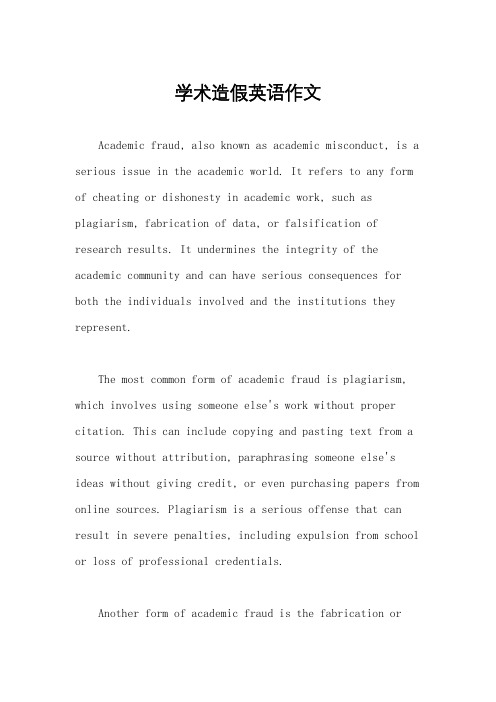
学术造假英语作文Academic fraud, also known as academic misconduct, is a serious issue in the academic world. It refers to any form of cheating or dishonesty in academic work, such as plagiarism, fabrication of data, or falsification of research results. It undermines the integrity of the academic community and can have serious consequences for both the individuals involved and the institutions they represent.The most common form of academic fraud is plagiarism, which involves using someone else's work without proper citation. This can include copying and pasting text from a source without attribution, paraphrasing someone else's ideas without giving credit, or even purchasing papers from online sources. Plagiarism is a serious offense that can result in severe penalties, including expulsion from school or loss of professional credentials.Another form of academic fraud is the fabrication orfalsification of data in research. This can involve making up data to support a particular hypothesis, altering or manipulating data to achieve desired results, orselectively reporting only the data that supports a particular conclusion. This not only undermines the credibility of the research but also has the potential to harm individuals who may rely on the false information for their own work or decision-making.In addition to plagiarism and data fabrication, academic fraud can also take the form of cheating on exams or assignments. This can include using unauthorized materials during exams, obtaining or sharing exam questions in advance, or hiring someone else to complete assignments. Cheating not only undermines the fairness of the academic evaluation process but also devalues the hard work and effort of those who have earned their grades honestly.Overall, academic fraud is a serious problem that has the potential to undermine the trust and credibility of the academic community. It is important for individuals and institutions to take proactive measures to prevent andaddress academic fraud, such as promoting ethical conduct, providing resources for proper citation and research practices, and implementing consequences for those who engage in academic misconduct. By working together to uphold the integrity of academic work, we can ensure that the pursuit of knowledge and truth remains a noble and respected endeavor.。
有关学术造假问题英语作文

有关学术造假问题英语作文Title: Academic Fraud: A Threat to Integrity in Research。
Academic fraud, a reprehensible act undermining the foundation of scholarly integrity, has emerged as a significant concern in contemporary academia. This unethical practice encompasses various forms, including plagiarism, fabrication of data, falsification of results, and unauthorized collaboration. The repercussions of academic fraud are far-reaching, jeopardizing thecredibility of research findings, eroding public trust, and tarnishing the reputation of individuals and institutions involved. Addressing this issue requires collective efforts from academic communities, policymakers, and stakeholders to uphold the principles of honesty, transparency, and accountability.Plagiarism, perhaps the most prevalent form of academic fraud, involves the unauthorized use or reproduction ofsomeone else's work without proper acknowledgment. This unethical behavior not only violates intellectual property rights but also distorts the originality and authenticityof scholarly contributions. In an era characterized by the ease of accessing information online, the temptation to plagiarize has increased, posing a significant challenge to maintaining academic integrity. Educational institutions must implement stringent policies and utilize plagiarism detection software to deter and identify instances of plagiarism effectively.Fabrication and falsification of data represent another egregious form of academic fraud, where researchers manipulate experimental results or fabricate data to align with predetermined hypotheses. Such misconduct not only compromises the validity and reliability of scientific findings but also undermines the progress of knowledge and innovation. The pressure to publish in prestigious journals, secure funding, or advance one's academic career often exacerbates the temptation to engage in fraudulent practices. Therefore, fostering a culture that prioritizes the quality and rigor of research over quantitative metricsis essential in mitigating the prevalence of data fabrication and falsification.Unauthorized collaboration, including ghostwriting and guest authorship, is another insidious aspect of academic fraud that undermines the transparency and accountability of scholarly endeavors. Ghostwriting, where individuals contribute substantially to research but are not credited as authors, distorts the attribution of intellectual contributions and misrepresents the true extent of researchers' involvement. Similarly, guest authorship, whereby individuals are listed as authors withoutfulfilling substantive contributions, compromises the integrity of authorship and misleads readers about the credibility of the research. Academic journals and institutions must enforce strict guidelines for authorship attribution and disclose any potential conflicts of interest to ensure transparency and accountability in scholarly publications.The consequences of academic fraud extend beyond individual researchers to the broader scientific communityand society at large. Misleading or fabricated research findings can have detrimental effects on public health, policy decisions, and technological advancements. Instances of academic fraud erode public trust in science and academia, casting doubt on the credibility and reliability of research outcomes. Moreover, the reputational damage inflicted on institutions implicated in academic fraud can have long-lasting repercussions, affecting their credibility, funding opportunities, and academic standing.To combat academic fraud effectively, a multifaceted approach encompassing prevention, detection, and enforcement mechanisms is imperative. Educational institutions should prioritize education and awareness initiatives to instill ethical values and promote responsible conduct in research. Rigorous peer review processes and the adoption of robust research integrity policies can help identify and deter instances of academic fraud. Additionally, fostering a supportive and collaborative research culture that values transparency, reproducibility, and open communication is essential in fostering a climate conducive to upholding academicintegrity.In conclusion, academic fraud represents a pervasive threat to the integrity of scholarly research, undermining the credibility of academic institutions and eroding public trust in science. Addressing this issue requires concerted efforts from stakeholders across academia, including researchers, educators, publishers, and policymakers. By promoting ethical conduct, transparency, and accountability in research practices, we can safeguard the integrity of academic endeavors and uphold the principles of scholarly excellence. Only through collective action can we combat academic fraud and preserve the integrity and credibility of the scholarly enterprise.。
学术造假的原因英语作文
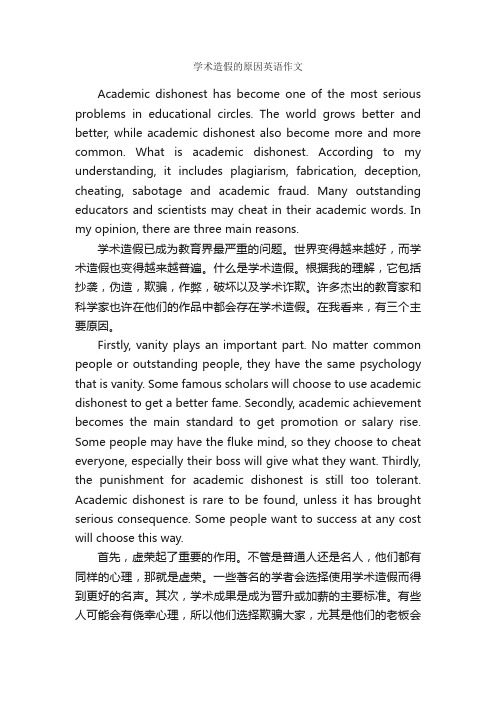
学术造假的原因英语作文Academic dishonest has become one of the most serious problems in educational circles. The world grows better and better, while academic dishonest also become more and more common. What is academic dishonest. According to my understanding, it includes plagiarism, fabrication, deception, cheating, sabotage and academic fraud. Many outstanding educators and scientists may cheat in their academic words. In my opinion, there are three main reasons.学术造假已成为教育界最严重的问题。
世界变得越来越好,而学术造假也变得越来越普遍。
什么是学术造假。
根据我的理解,它包括抄袭,伪造,欺骗,作弊,破坏以及学术诈欺。
许多杰出的教育家和科学家也许在他们的作品中都会存在学术造假。
在我看来,有三个主要原因。
Firstly, vanity plays an important part. No matter common people or outstanding people, they have the same psychology that is vanity. Some famous scholars will choose to use academic dishonest to get a better fame. Secondly, academic achievement becomes the main standard to get promotion or salary rise. Some people may have the fluke mind, so they choose to cheat everyone, especially their boss will give what they want. Thirdly, the punishment for academic dishonest is still too tolerant. Academic dishonest is rare to be found, unless it has brought serious consequence. Some people want to success at any cost will choose this way.首先,虚荣起了重要的作用。
学术造假的英语作文
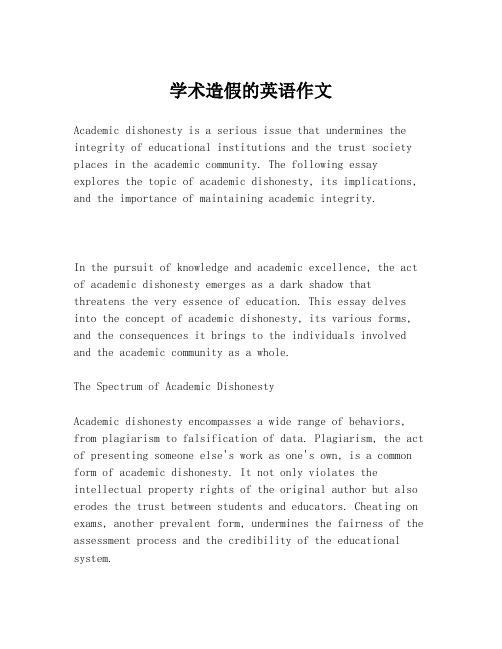
学术造假的英语作文Academic dishonesty is a serious issue that undermines the integrity of educational institutions and the trust society places in the academic community. The following essay explores the topic of academic dishonesty, its implications, and the importance of maintaining academic integrity.In the pursuit of knowledge and academic excellence, the act of academic dishonesty emerges as a dark shadow that threatens the very essence of education. This essay delves into the concept of academic dishonesty, its various forms, and the consequences it brings to the individuals involved and the academic community as a whole.The Spectrum of Academic DishonestyAcademic dishonesty encompasses a wide range of behaviors, from plagiarism to falsification of data. Plagiarism, the act of presenting someone else's work as one's own, is a common form of academic dishonesty. It not only violates the intellectual property rights of the original author but also erodes the trust between students and educators. Cheating on exams, another prevalent form, undermines the fairness of the assessment process and the credibility of the educational system.Consequences of Academic DishonestyThe consequences of academic dishonesty are far-reaching. For the individual student, the immediate repercussions can include failing the assignment or exam, disciplinary actions, and even expulsion from the institution. The long-termeffects are equally damaging, as a reputation for dishonesty can follow a student into their professional life, hindering career opportunities and personal growth.Institutional and Societal ImpactBeyond the individual, academic dishonesty also affects the institution and society. It erodes the public's trust in the educational system, casting doubt on the value of degrees and qualifications. Furthermore, it undermines the credibility of research and scholarly work, which are the foundations of innovation and progress in society.Promoting Academic IntegrityTo combat academic dishonesty, educational institutions must take proactive measures. This includes implementing strict policies against dishonest practices, educating students about the importance of academic integrity, and providing resources to help students develop their research and writing skills. Additionally, fostering a culture of honesty and respect for intellectual property is essential.ConclusionIn conclusion, academic dishonesty is a multifaceted issue that requires a comprehensive approach to address. It is the responsibility of students, educators, and institutions to uphold the values of honesty and integrity in the pursuit of knowledge. By doing so, we can ensure that education remains a trustworthy and transformative experience for all.This essay serves as a reflection on the importance of academic integrity and the detrimental effects of academic dishonesty. It is a reminder that the pursuit of knowledge should be grounded in honesty and respect for the work of others.。
学术欺诈的危害英文作文

学术欺诈的危害英文作文Academic fraud refers to the act of dishonesty in the academic world, which includes plagiarism, fabrication, and falsification of data. It poses significant harm not only to the individuals involved but also to the entire academic community. In this essay, I will discuss the detrimental effects of academic fraud and provide examples toillustrate its consequences.English Response:Academic fraud undermines the integrity of the educational system. When students or researchers engage in dishonest practices, they compromise the trust that is essential in academia. For instance, if a student plagiarizes someone else's work, they are essentially stealing intellectual property and taking credit for something they did not create. This not only devalues the original author's work but also diminishes the credibility of the student and the institution they represent.Moreover, academic fraud hampers the progress of knowledge and scientific advancements. Research is built upon the foundation of previous studies, and when fraudulent data or fabricated results are introduced, it distorts the entire body of knowledge. For example, imagine a researcher who fabricates data to support a particular hypothesis. If other researchers base their work on these false findings, it can lead to wasted resources, misguided efforts, and potentially harmful consequences if the faulty information is applied in real-world scenarios.Additionally, academic fraud can have serious consequences for individuals involved. For students, cheating or plagiarizing may provide short-term benefits such as higher grades or academic recognition. However, in the long run, it hinders their personal and professional growth. Employers and academic institutions value integrity and honesty, and discovering a history of academic fraud can severely damage one's reputation and future prospects.In the case of researchers, academic fraud can resultin severe consequences such as loss of funding, termination of employment, and damage to their professional reputation. For instance, a scientist who falsifies research findings may not only lose their current position but also face difficulties in finding future employment or securing grants for their work. This not only affects the individual but also the scientific community as a whole, as it erodes trust and credibility in the research field.In conclusion, academic fraud has far-reaching consequences that extend beyond individual actions. It undermines the integrity of the educational system, obstructs the progress of knowledge, and can have severe repercussions for those involved. It is crucial for institutions and individuals to promote a culture of academic honesty and integrity to prevent and address academic fraud.中文回答:学术欺诈对教育系统的诚信造成了破坏。
学术欺诈英文作文
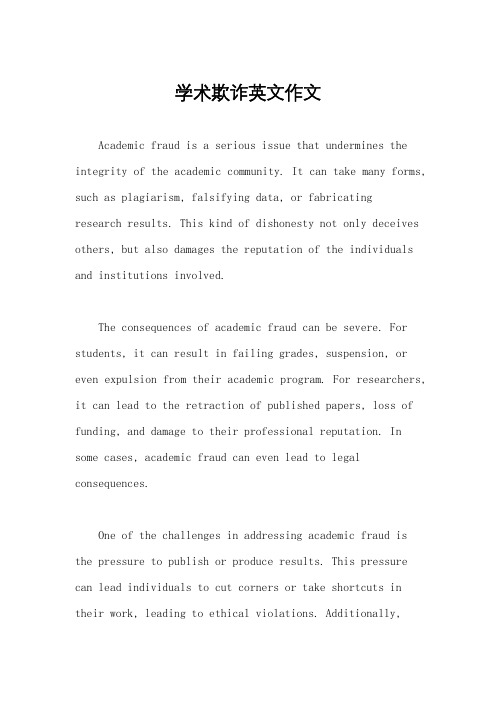
学术欺诈英文作文Academic fraud is a serious issue that undermines the integrity of the academic community. It can take many forms, such as plagiarism, falsifying data, or fabricatingresearch results. This kind of dishonesty not only deceives others, but also damages the reputation of the individuals and institutions involved.The consequences of academic fraud can be severe. For students, it can result in failing grades, suspension, or even expulsion from their academic program. For researchers, it can lead to the retraction of published papers, loss of funding, and damage to their professional reputation. In some cases, academic fraud can even lead to legal consequences.One of the challenges in addressing academic fraud is the pressure to publish or produce results. This pressure can lead individuals to cut corners or take shortcuts in their work, leading to ethical violations. Additionally,the competitive nature of academia can create an environment where individuals feel the need to exaggerate their findings in order to stand out.In order to combat academic fraud, it is important for institutions to have clear policies and procedures in place for addressing allegations of dishonesty. This includes educating students and researchers about what constitutes fraud and the potential consequences. It also requires promoting a culture of academic integrity and ethical conduct.Ultimately, preventing academic fraud requires a collective effort from all members of the academic community. This includes holding individuals accountablefor their actions, promoting transparency in research practices, and fostering a culture of honesty and integrity. By working together, we can help ensure that academic fraud is not tolerated and that the pursuit of knowledge is conducted with the highest ethical standards.。
学术作假英文作文

学术作假英文作文Academic dishonesty, such as falsifying research findings or plagiarizing others' work, is a serious issue that undermines the integrity of the academic community. It is a shortcut to success that many individuals resort to, driven by the pressure to achieve and the fear of failure. However, the consequences of such actions can be grave, not only for the individuals involved but also for the overall trust and credibility of the academic field.When it comes to academic misconduct, it's like a game of cat and mouse. Students are constantly trying to outsmart their professors, finding ways to cheat on exams or copy assignments without getting caught. It's a never-ending battle, with students becoming more creative intheir methods and professors becoming more vigilant intheir detection. It's a constant struggle between the desire for good grades and the need for academic honesty.Sometimes, the temptation to cheat can be overwhelming.The pressure to excel academically is immense, and the fear of failure can be paralyzing. In such situations, students may convince themselves that a little dishonesty won't hurt anyone. They may rationalize their actions by thinking that everyone else is doing it too, so why should they be left behind? But in reality, academic dishonesty only leads to a false sense of achievement and a lack of personal growth.Plagiarism, another form of academic dishonesty, is equally damaging. It involves taking someone else's work and presenting it as one's own, without proper attribution. It not only undermines the original author's hard work and creativity but also denies the plagiarizer the opportunity to develop their own skills and knowledge. It's a lose-lose situation, where both parties suffer in the end.The consequences of academic dishonesty can be severe. Students who are caught cheating or plagiarizing may face disciplinary action, ranging from failing grades to expulsion from their academic institution. Moreover, their reputation may be tarnished, making it difficult for them to gain trust and credibility in their future endeavors.The impact of such actions extends beyond the individual, affecting the overall integrity of the academic community.To combat academic dishonesty, educational institutions need to prioritize the importance of academic integrity. They should implement strict policies and procedures to detect and prevent cheating and plagiarism. Additionally, fostering a culture of honesty and ethical behavior among students is crucial. This can be achieved through awareness campaigns, workshops, and open discussions about the consequences of academic misconduct.In conclusion, academic dishonesty is a detrimental practice that undermines the integrity of the academic community. It is driven by the pressure to succeed and the fear of failure, but the consequences can be severe. Students need to understand the importance of academic integrity and the value of their own personal growth. Educational institutions should take proactive measures to prevent and address academic dishonesty, ensuring a fair and trustworthy academic environment for all.。
20XX英语专四作文范文:学术造假.doc
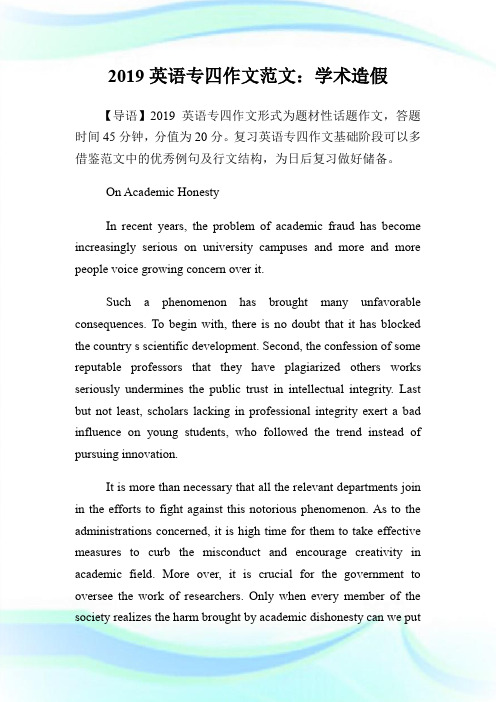
2019英语专四作文范文:学术造假【导语】2019英语专四作文形式为题材性话题作文,答题时间45分钟,分值为20分。
复习英语专四作文基础阶段可以多借鉴范文中的优秀例句及行文结构,为日后复习做好储备。
On Academic HonestyIn recent years, the problem of academic fraud has become increasingly serious on university campuses and more and more people voice growing concern over it.Such a phenomenon has brought many unfavorable consequences. To begin with, there is no doubt that it has blocked the country s scientific development. Second, the confession of some reputable professors that they have plagiarized others works seriously undermines the public trust in intellectual integrity. Last but not least, scholars lacking in professional integrity exert a bad influence on young students, who followed the trend instead of pursuing innovation.It is more than necessary that all the relevant departments join in the efforts to fight against this notorious phenomenon. As to the administrations concerned, it is high time for them to take effective measures to curb the misconduct and encourage creativity in academic field. More over, it is crucial for the government to oversee the work of researchers. Only when every member of the society realizes the harm brought by academic dishonesty can we putan end to the abominable practice.本文关键字:英语专四作文专四作文英语专四作文范文。
学术造假案例英语作文
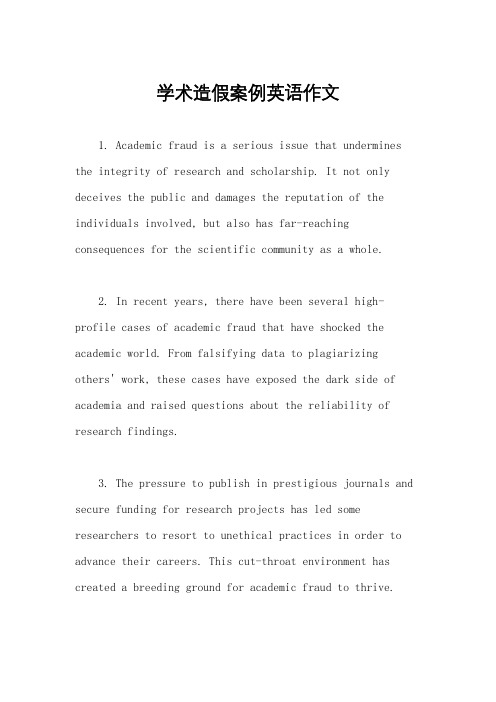
学术造假案例英语作文1. Academic fraud is a serious issue that undermines the integrity of research and scholarship. It not only deceives the public and damages the reputation of the individuals involved, but also has far-reaching consequences for the scientific community as a whole.2. In recent years, there have been several high-profile cases of academic fraud that have shocked the academic world. From falsifying data to plagiarizing others' work, these cases have exposed the dark side of academia and raised questions about the reliability of research findings.3. The pressure to publish in prestigious journals and secure funding for research projects has led some researchers to resort to unethical practices in order to advance their careers. This cut-throat environment has created a breeding ground for academic fraud to thrive.4. The consequences of academic fraud can be devastating for the individuals involved. Not only do they face disciplinary action, such as losing their job or having their research funding revoked, but they also risk tarnishing their reputation and credibility in the academic community.5. It is essential for the academic community to take a strong stance against academic fraud and implement measures to prevent it from happening. This includes promoting transparency in research practices, encouraging collaboration and peer review, and holding researchers accountable for their actions.6. Ultimately, academic fraud not only undermines the credibility of research findings, but also erodes the trust that society places in the scientific community. It is imperative that researchers uphold the highest standards of integrity and ethics in their work to ensure the advancement of knowledge and the betterment of society.。
大学英语作文学术造假现象 On Academic Honesty
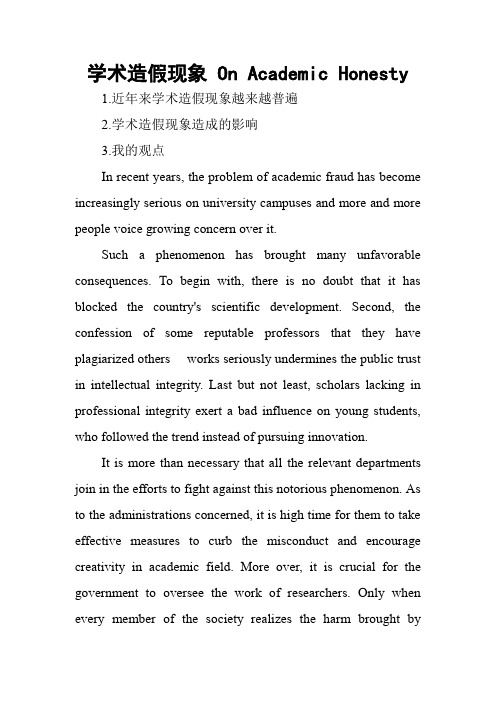
学术造假现象 On Academic Honesty1.近年来学术造假现象越来越普遍2.学术造假现象造成的影响3.我的观点In recent years, the problem of academic fraud has become increasingly serious on university campuses and more and more people voice growing concern over it.Such a phenomenon has brought many unfavorable consequences. To begin with, there is no doubt that it has blocked the country's scientific development. Second, the confession of some reputable professors that they have plagiarized others works seriously undermines the public trust in intellectual integrity. Last but not least, scholars lacking in professional integrity exert a bad influence on young students, who followed the trend instead of pursuing innovation.It is more than necessary that all the relevant departments join in the efforts to fight against this notorious phenomenon. As to the administrations concerned, it is high time for them to take effective measures to curb the misconduct and encourage creativity in academic field. More over, it is crucial for the government to oversee the work of researchers. Only when every member of the society realizes the harm brought byacademic dishonesty can we put an end to the abominable practice.。
英语作文之学术造假

>>学术造假现象1.近年来学术造假现象越来越普遍2.学术造假现象造成的影响3.我的观点>>范文背诵On Academic HonestyIn recent years, the problem of academic fraud has become increasingly serious on university campuses and more and more people voice growing concern over it.Such a phenomenon has brought many unfavorable consequences. To begin with, there is no doubt that it has blocked the country's scientific development. Second, the confession of some reputable professors that they have plagiarized others works seriously undermines the public trust in intellectual integrity. Last but not least, scholars lacking in professional integrity exert a bad influence on young students, who followed the trend instead of pursuing innovation.It is more than necessary that all the relevant departments join in the efforts to fight against this notorious phenomenon. As to the administrations concerned, it is high time for them to take effective measures to curb the misconduct and encourage creativity in academic field. More over, it is crucial for the government to oversee the work of researchers. Only when every member of the society realizes the harm brought by academic dishonesty can we put an end to the abominable practice.>>亮点词汇①blockv.阻碍②confessionn.承认,坦白③plagiarizev.抄袭,剽窃④underminev.破坏,损害⑤exert a bad influence on对……造成不好的影响⑥overseev.监管⑦abominablea.令人憎恶的,恶劣的>>文章点评第一段点明文章论述的问题,即学术上的弄虚作假,同时指出这个问题日趋严重,引起越来越多的关注。
学生学术造假英语作文
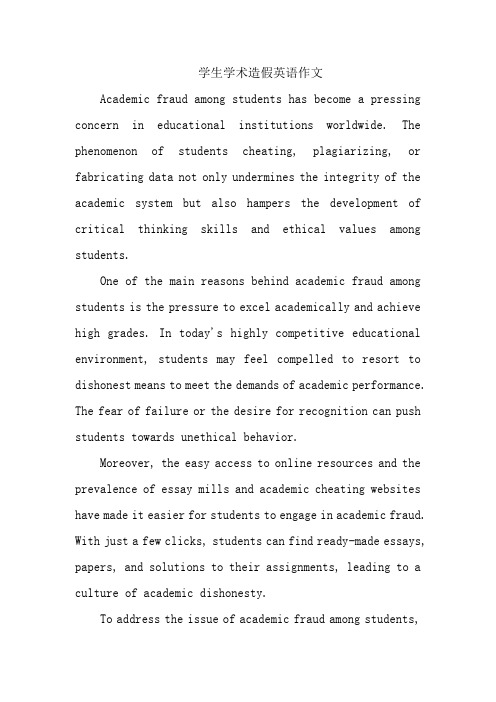
学生学术造假英语作文Academic fraud among students has become a pressing concern in educational institutions worldwide. The phenomenon of students cheating, plagiarizing, or fabricating data not only undermines the integrity of the academic system but also hampers the development of critical thinking skills and ethical values among students.One of the main reasons behind academic fraud among students is the pressure to excel academically and achieve high grades. In today's highly competitive educational environment, students may feel compelled to resort to dishonest means to meet the demands of academic performance. The fear of failure or the desire for recognition can push students towards unethical behavior.Moreover, the easy access to online resources and the prevalence of essay mills and academic cheating websites have made it easier for students to engage in academic fraud. With just a few clicks, students can find ready-made essays, papers, and solutions to their assignments, leading to a culture of academic dishonesty.To address the issue of academic fraud among students,educational institutions need to emphasize the importance of academic integrity and ethical conduct. Teachers and educators should educate students about the consequences of academic fraud and promote a culture of honesty and integrity in the academic community. Encouraging critical thinking, fostering a supportive learning environment, and providing guidance on proper citation and research practices can help prevent academic fraud among students.中文翻译:学生学术造假已经成为全球教育机构面临的紧迫问题。
- 1、下载文档前请自行甄别文档内容的完整性,平台不提供额外的编辑、内容补充、找答案等附加服务。
- 2、"仅部分预览"的文档,不可在线预览部分如存在完整性等问题,可反馈申请退款(可完整预览的文档不适用该条件!)。
- 3、如文档侵犯您的权益,请联系客服反馈,我们会尽快为您处理(人工客服工作时间:9:00-18:30)。
2019英语专四作文范文:学术造假
On Academic Honesty
In recent years, the problem of academic fraud has become increasingly serious on university campuses and more and more people voice growing concern over it.
Such a phenomenon has brought many unfavorable consequences. To begin with, there is no doubt that it has blocked the countrys scientific development. Second, the confession of some reputable professors that they have plagiarized others works seriously undermines the public
trust in intellectual integrity. Last but not least, scholars lacking in professional integrity exert a bad influence on young students, who followed the trend instead of pursuing innovation.
It is more than necessary that all the relevant departments join in the efforts to fight against this notorious phenomenon. As to the administrations concerned, it is high time for them to take effective measures to curb the misconduct and encourage creativity in academic field. More over, it is crucial for the government to oversee the work of researchers. Only when every member of the society realizes the harm brought by academic dishonesty can we put an end to the abominable practice.
本文关键字:英语专四作文专四作文英语专四作文范文。
